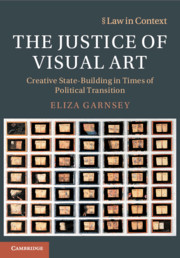Book contents
- The Justice of Visual Art
- The Law in Context Series
- The Justice of Visual Art
- Copyright page
- Dedication
- Contents
- Figures
- Acknowledgements
- Abbreviations
- 1 Introduction
- 2 Art and Justice in Times of Transition
- Part I Recognising Transitional Justice in the Nation State
- 3 From Prison to Court
- 4 Shaping ‘Legal’ Space
- 5 The Art of Recognition
- 6 The Visual Jurisprudence of Transition
- Part II Representing Transitional Justice on the Global Stage
- References
- Index
5 - The Art of Recognition
from Part I - Recognising Transitional Justice in the Nation State
Published online by Cambridge University Press: 17 October 2019
- The Justice of Visual Art
- The Law in Context Series
- The Justice of Visual Art
- Copyright page
- Dedication
- Contents
- Figures
- Acknowledgements
- Abbreviations
- 1 Introduction
- 2 Art and Justice in Times of Transition
- Part I Recognising Transitional Justice in the Nation State
- 3 From Prison to Court
- 4 Shaping ‘Legal’ Space
- 5 The Art of Recognition
- 6 The Visual Jurisprudence of Transition
- Part II Representing Transitional Justice on the Global Stage
- References
- Index
Summary
Chapter 5, The Art of Recognition, explores three dominant narratives which emerge from the art collection of the Constitutional Court of South Africa. These are narratives which recognise people, community, and time as key to the project of justice and democracy in South Africa. Drawing on interviews with artists and viewers, I conduct a visual analysis of artworks by the Bambanani Women’s Group, Marlene Dumas, Dumile Feni, David Goldblatt, Judith Mason, Thomas Mulcaire, Sipho Ndlovu, Georgia Papageorge and Sue Williamson. I argue that the three narratives which emerge from the art collection play a central role in shaping the Court’s larger transitional justice story.They draw attention to how the impossibility of attaining universal justice, is what drives justice practices and the enactment of human rights for particular people and communities at particular times.
Keywords
- Type
- Chapter
- Information
- The Justice of Visual ArtCreative State-Building in Times of Political Transition, pp. 86 - 112Publisher: Cambridge University PressPrint publication year: 2019

